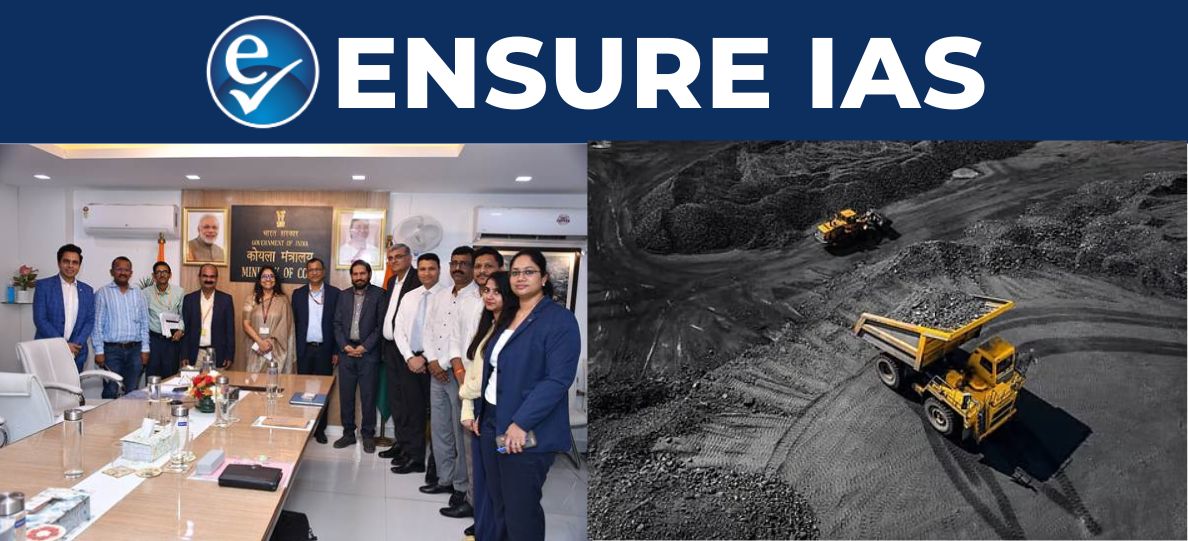- Courses
- GS Full Course 1 Year
- GS Full Course 2 Year
- GS Full Course 3 Year
- GS Full Course Till Selection
- Answer Alpha: Mains 2025 Mentorship
- MEP (Mains Enrichment Programme) Data, Facts
- Essay Target – 150+ Marks
- Online Program
- GS Recorded Course
- NCERT- First Ladder
- Polity
- Geography
- Economy
- Ancient, Medieval and Art & Culture AMAC
- Modern India, Post Independence & World History
- Environment
- Governance
- Science & Technology
- International Relations and Internal Security
- Disaster Management
- Ethics
- Current Affairs
- Indian Society and Social Issue
- CSAT
- 5 LAYERED ARJUNA Mentorship
- Public Administration Optional
- ABOUT US
- OUR TOPPERS
- TEST SERIES
- FREE STUDY MATERIAL
- VIDEOS
- CONTACT US
Ministry of Coal Announces Selected Applicants under Category-II of Financial Incentive Scheme
Ministry of Coal Announces Selected Applicants under Category-II of Financial Incentive Scheme
08-02-2025

- In February 2025, the Ministry of Coal announced the selected applicants under Category-II of the Financial Incentive Scheme (FIS).
- The Financial Incentive Scheme is a crucial part of India’s National Coal Gasification Mission.
- It aims to transform India’s coal industry into a cleaner and more efficient sector by shifting toward gasification technologies.
- The scheme aims to promote coal gasification projects by encouraging both private companies and public sector undertakings (PSUs) to actively participate.
Key Points of the Financial Incentive Scheme (FIS)
- Launch Year: 2024
- Outlay: ₹8,500 crore
- Implementation: Ministry of Coal
- Objective: To encourage private and public sector participation in coal gasification projects.
- Categories:
- Category-I and Category-III applicants were announced earlier.
- Category-II, focused on private sector and PSUs, was announced in February 2025.
What is Coal Gasification?
Coal gasification is a technological process that converts carbon-rich raw materials, like coal, into syngas (synthesis gas), which is a mixture of carbon monoxide (CO) and hydrogen (H2).
How Does Coal Gasification Work?
- The process takes place in a gasifier, a high-temperature, high-pressure vessel.
- Oxygen and steam are introduced into the gasifier, which reacts with the coal to produce syngas.
Why Coal Gasification?
- The syngas produced is a cleaner form of energy compared to traditional coal burning.
- Syngas has a wide range of applications:
- Manufacturing of chemicals like methanol, ethanol, Urea, Ammonia, and olefins.
- Used as hydrogen for industries like steel production.
- Substitute for natural gas.
- Electricity generation.
Significance of Coal Gasification for India
- India has vast coal reserves, estimated at 378.21 billion tonnes (National Coal Inventory, 2023).
- Gasifying coal reduces dependence on imported oil and gas while utilizing abundant local resources.
- Coal gasification is considered a cleaner alternative to traditional coal burning, as it reduces the direct emission of pollutants like sulfur dioxide and nitrogen oxides, which contribute to air pollution.
- By shifting from conventional coal burning to coal gasification, India can reduce its dependency on foreign energy imports and improve its energy security.
National Coal Gasification Mission:
- The National Coal Gasification Mission is an ambitious initiative aimed at gasifying 100 million tonnes (MT) of coal by 2030. The mission will be executed in three phases:
- Phase I: Setting up pilot projects to test and refine coal gasification technology.
- Phase II: Upscaling efforts by partnering with Coal India Limited and other entities to promote large-scale gasification projects.
- Phase III: Full-scale gasification of 90 MT of coal after technological advancements are made in Phase II.
- The mission is a key component of India's strategy to reduce carbon emissions, increase energy self-reliance, and use domestic resources more efficiently.
Impact of the Financial Incentive Scheme (FIS)
- By encouraging both the private sector and PSUs to participate, the scheme will significantly speed up India’s efforts toward achieving the 100 MT coal gasification target by 2030.
- Coal gasification is a cleaner alternative to traditional coal burning, helping India reduce its carbon emissions and contribute to global climate goals.
- The financial support provided through this scheme will create job opportunities, drive economic growth, and contribute to the development of advanced energy technologies.
- By utilizing domestic coal resources more efficiently, India can reduce its dependence on foreign energy imports, thus strengthening its energy security and making its energy mix more sustainable.
Conclusion
India’s coal gasification mission is a key part of its larger energy transition plan. The Financial Incentive Scheme (FIS) is crucial in accelerating these efforts by providing financial support to private sector companies and PSUs. The scheme encourages the adoption of coal gasification technologies, which are not only more environmentally friendly but also offer economic benefits by utilizing India’s vast coal reserves more efficiently.
|
Also Read |
|
| Public Administration Optional | |
| Question Answer Practice For UPSC | |




